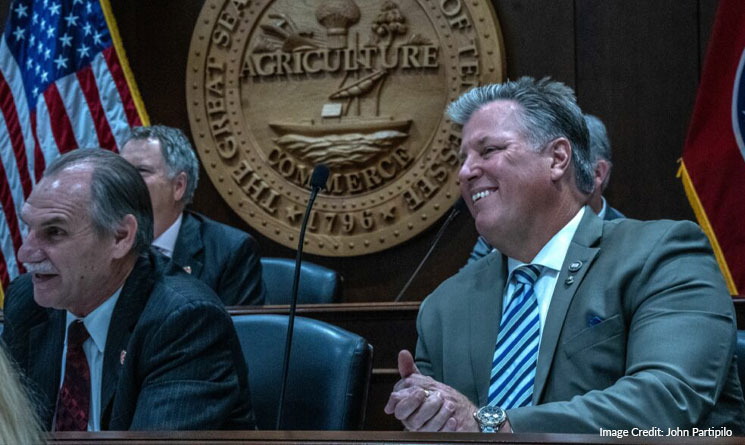Photo: Rep. Scott Cepicky, R-Culleoka, at right, took issues with a move by Cookeville Republican Rep. Ryan Williams to “committee shop” a charter schools bill. Photo Credit: John Partipilo
By Sam Stockard [Tennessee Lookout -CC BY-NC-ND 4.0] –
Legislation designed to shift “under-utilized” public school buildings to charter schools looked like it was dead this week but then resurfaced the same day, drawing a rebuke from a subcommittee chairman.
The sharp words came Tuesday from Rep. Scott Cepicky, R-Culleoka, as Rep. Ryan Williams, R-Cookeville, introduced a bill, HB591, giving charter schools the first right of refusal to public school buildings not operating at 50% capacity or more and a shot at a cheap lease or price less than the market would bring.
Williams brought the bill before the House K-12 Subcommittee not long after Rep. Mark White, chairman of the House Education Administration Committee, took a similar bill off notice in the House Instruction Subcommittee chaired by Cepicky. That bill also would have made it easier for charter operators to open schools, in part by sidestepping the local school board and obtaining approval from a state charter authorizer appointed by the governor.
If you get a committee you don’t like, you just amend the bill so it’ll get shifted into another committee, one that is more favorable to you. That’s the first thing I take issue with. – Rep. Scott Cepicky, R-Culleoka, to Rep. Ryan Williams, R-Cookeville, over Williams’ bill
Cepicky contended that the lobbying firm pushing the legislation spent five weeks trying to pass it in the House Education Instruction Committee and “refused” to make changes lawmakers sought dealing with property sales at “fair market value,” a price agreed to by the seller and buyer without pressure.
Such a law, though, could cost Metro Nashville taxpayers millions of dollars because of the escalating price of property.
Cepicky noted Williams’ bill shows how the legislative process can be circumvented by lobbyists.
“If you get a committee you don’t like, you just amend the bill so it’ll get shifted into another committee, one that is more favorable to you,” Cepicky said. “That’s the first thing I take issue with.”
Williams did not respond directly to Cepicky’s complaint but noted in the discussion it was the first education bill he has sponsored this year.
Ultimately, Williams postponed consideration of the bill on Tuesday because of questions lawmakers raised.
*** Click Here to Support Conservative Journalism in Tennessee. We can’t bring you stories like this without your support!***
The legislation would make it easier for charter schools to take over public school buildings if 50% or less of the building is in use.
Critics of the legislation point out nearly any school building could be defined as “under-utilized” if it has a low number of students in classrooms or because of large spaces such as auditoriums, gymnasiums and career and technical education wings.
Lawmakers are leery of changes in charter school rules amid reports that Gov. Bill Lee invited Michigan-based Hillsdale College to start 100 charter schools in Tennessee. The college announced it is starting a nonprofit organization that will focus on charter operations in Tennessee, but the college’s president reportedly said he wants only 50 here.
Applications have been made for these “classical” charters in Williamson and Montgomery counties. But Gov. Lee said this week state law does not allow religious-affiliated schools to be opened as public schools.
Williams, meanwhile, contended that an “agreement would have to be made” by the public school system and the charter organization and that if the school district decided to sell the property it could get more than fair market value.
Opponents of the bill differ.
Cepicky pointed out that, based on the legislation, Maury County Schools in his district could be on the hook for $20 million worth of asbestos removal at McDowell Elementary School if a charter operator decided to take over the building.
Rep. Harold Love, D-Nashville, also raised questions about the bill when he noted Metro Nashville Public Schools had several buildings it started using for other purposes several years ago. The legislation could force the district into negotiating a sale with a charter organization, he said.
Williams responded that the property owner could sell it to another buyer if it can’t reach an agreement with the charter organization. But Love said he is concerned about putting “extra pressure” on school districts.
“For whatever reason, there’s bad blood sometimes between the entities,” Love said.
Likewise, state Rep. John Ray Clemmons, D-Nashville, called Williams’ bill “troubling.” He stopped short of saying it was identical to the bill taken off notice by White, R-East Memphis.
However, he raised questions, saying it could apply to a teacher training building, which isn’t used for student classrooms, next to Eakin Elementary School in Nashville.
Clemmons also said Hillwood High School in West Nashville, which is being closed because of construction on a new Hillwood High closer to Bellevue, could be considered vacant once the new site opens.
The community wants to turn the old campus into a park and community center, and he raised concerns that the legislation would give a charter school operator the ability to “usurp” the will of local residents. He noted property transfers often run into problems, stretching out the time it would take for Metro Nashville Parks to take over the building.
Williams countered that if an intended use for the building was in place, a charter organization wouldn’t be able to take over the building, unless it sat empty for an extended period.
Nevertheless, after a short recess, Williams said he would try to come up with answers and postpone consideration of the bill until the end of the subcommittee’s calendar.

About the Author: Sam Stockard is a veteran Tennessee reporter and editor, having written for the Daily News Journal in Murfreesboro, where he served as lead editor when the paper won an award for being the state’s best Sunday newspaper two years in a row. He has led the Capitol Hill bureau for The Daily Memphian. His awards include Best Single Editorial from the Tennessee Press Association. Follow Stockard on Twitter @StockardSam




